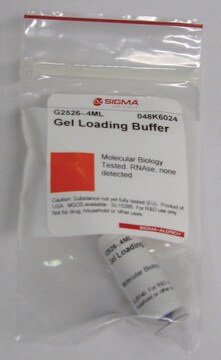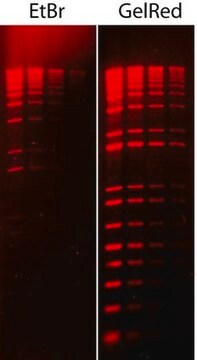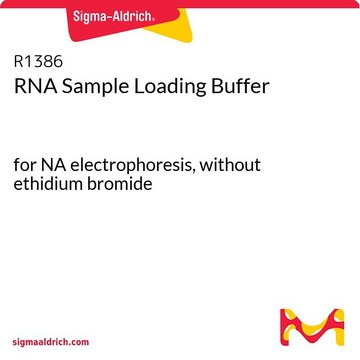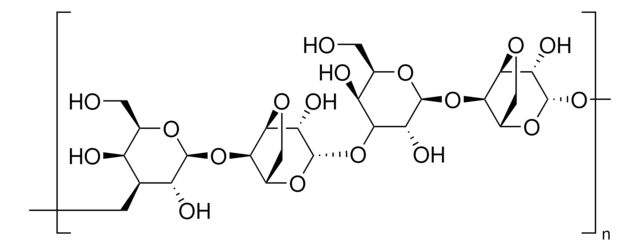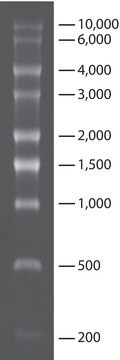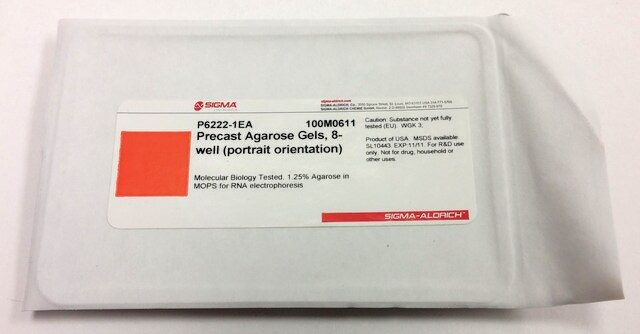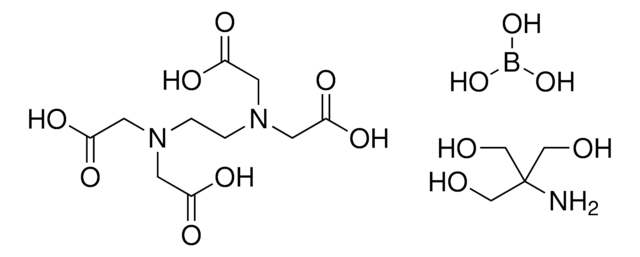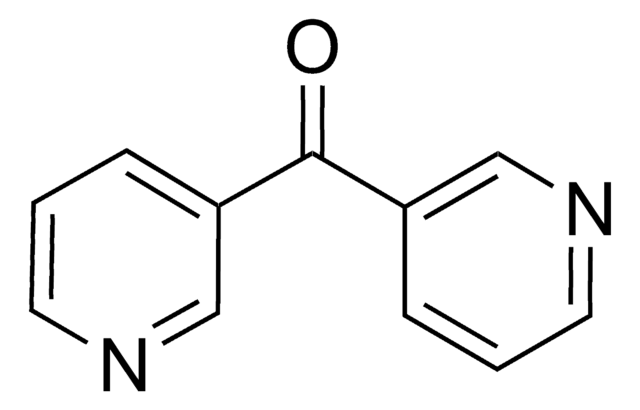Wszystkie zdjęcia(1)
Kluczowe dokumenty
G7654
Gel Loading Solution
for NA electrophoresis, solution
Synonim(y):
DNA Gel Loading Solution, Gel Loading Buffer
Zaloguj sięWyświetlanie cen organizacyjnych i kontraktowych
About This Item
Kod UNSPSC:
12161703
NACRES:
NA.25
Polecane produkty
klasa czystości
for molecular biology
Poziom jakości
Formularz
solution
stężenie
6 ×
temp. przechowywania
2-8°C
Opis ogólny
Gel loading solution is used as a tracking dye during electrophoresis. The dyes have a slight negative charge and will migrate the same direction as DNA, allowing the user to monitor the progress of molecules moving through the gel. The rate of migration varies with gel composition. Dilute 1:6 with sample before loading.
Zastosowanie
Suitable for use with agarose or non-denaturing polyacrylamide gel electrophoresis (PAGE), which may be part of Northern and Southern blot hybridization procedures.
Komponenty
Gel loading buffer contains 0.25% bromophenol blue, 0.25% xylene cyanol, and 40% sucrose.
Inne uwagi
Band migration can be expected as follows:
On polyacrylamide gels, xylene cyanole comigrates with approximately 450-460 bp DNA, while bromophenol blue comigrates with 15-100 bp DNA. On 0.5 – 1.4% agarose gels, xylene cyanole comigrates with 4 kb dsDNA, while bromophenol blue comigrates with 300 bp dsDNA.
On polyacrylamide gels, xylene cyanole comigrates with approximately 450-460 bp DNA, while bromophenol blue comigrates with 15-100 bp DNA. On 0.5 – 1.4% agarose gels, xylene cyanole comigrates with 4 kb dsDNA, while bromophenol blue comigrates with 300 bp dsDNA.
Ta strona może zawierać tekst przetłumaczony maszynowo.
produkt powiązany
Numer produktu
Opis
Cennik
Kod klasy składowania
12 - Non Combustible Liquids
Klasa zagrożenia wodnego (WGK)
WGK 2
Temperatura zapłonu (°F)
Not applicable
Temperatura zapłonu (°C)
Not applicable
Wybierz jedną z najnowszych wersji:
Masz już ten produkt?
Dokumenty związane z niedawno zakupionymi produktami zostały zamieszczone w Bibliotece dokumentów.
Klienci oglądali również te produkty
David R Macinga et al.
Antimicrobial agents and chemotherapy, 47(8), 2526-2537 (2003-07-25)
We have characterized an early series of 5,6-bridged dioxinoquinolones which behaved strikingly different from typical quinolones. The 5,6-bridged dioxinoquinolones inhibited Escherichia coli DNA gyrase supercoiling activity but, unlike typical quinolones, failed to stimulate gyrase-dependent cleavable complex formation. Analogous unsubstituted compounds
Sambrook, J., et al.
Molecular Cloning: A Laboratory Manual, 6-6 (1989)
M K Bolla et al.
Journal of lipid research, 40(12), 2340-2345 (1999-12-10)
The apoE gene exhibits two common polymorphisms that have been associated with both coronary artery disease and Alzheimer's disease. The polymorphisms create the three allelic isoforms E2, E3, and E4 which are encoded by Cys;-Cys, Cys;-Arg, and Arg;-Arg at amino
S Henry et al.
Vox sanguinis, 70(1), 21-25 (1996-01-01)
While screening Le(a+b+)Polynesian DNA samples for a candidate Se(w) allele, a point mutation (C571-->T) resulting in a new stop codon (Arg191-->stop) in the alpha(1,2)fucosyltransferase gene (FUT2) was identified. This point mutation resulted in the gaining of a new restriction enzyme
Jung-Lim Lee et al.
Journal of microbiological methods, 67(3), 456-462 (2006-12-22)
Ethidium bromide monoazide (EMA) was utilized to selectively allow conventional PCR amplification of target DNA from viable but not dead cells from a broth culture of bacterial mixed flora derived from cod fillets. The universal primers designated DG74 and RW01
Nasz zespół naukowców ma doświadczenie we wszystkich obszarach badań, w tym w naukach przyrodniczych, materiałoznawstwie, syntezie chemicznej, chromatografii, analityce i wielu innych dziedzinach.
Skontaktuj się z zespołem ds. pomocy technicznej